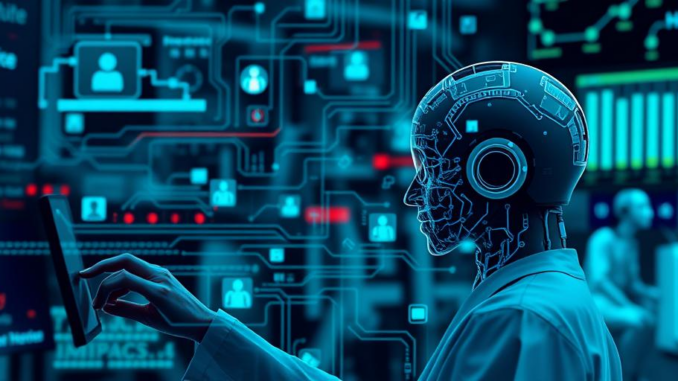
Summary
This article discusses the increasing threat of cyberattacks in healthcare, emphasizing the need for AI knowledge among healthcare leaders. It explores how AI can be used for both attacks and defense, highlighting the importance of robust cybersecurity strategies and skilled personnel. The article also suggests practical measures for healthcare organizations to enhance their cybersecurity posture.
Safeguard patient information with TrueNASs self-healing data technology.
** Main Story**
AI is revolutionizing healthcare, no doubt about it. We’re seeing amazing advancements in patient care, streamlined workflows, and just overall innovation. But, and it’s a big but, this digital transformation is also opening the door to some serious cybersecurity risks. As healthcare gets more and more reliant on connected systems and AI tools, they’re, well, frankly, becoming sitting ducks for sophisticated cyberattacks. So, healthcare leaders need to make AI cybersecurity a top priority. They have to get clued up and get the right resources in place to navigate what is, let’s be honest, an ever-evolving threat landscape. It’s crucial to be ready.
The Double-Edged Sword of AI
Now, AI in cybersecurity is a real double-edged sword. It can be a potent weapon, but it’s also a pretty strong shield, too. While it’s got huge potential for beefing up our defenses, it can also, get this, be used by bad actors to launch more targeted and effective attacks. It’s a bit of a cat-and-mouse game, isn’t it?
AI-Powered Attacks: The Dark Side
-
Lowered Barrier to Entry: Here’s the thing, AI has kind of leveled the playing field for cybercrime. It’s made it easier for, shall we say, less-than-technical folks to get in on the action. Automated tools and readily available AI-powered malware? It means attacks can be launched with minimal effort. It’s a bit scary when you think about it.
-
Sophisticated Attacks: I saw a demo of this the other day. AI algorithms can sift through mountains of data. The result? Identifying vulnerabilities and crafting highly targeted attacks becomes much easier. Making them harder to detect and defend against is a real concern. That said it includes techniques like feedback poisoning where AI models are purposefully misdirected by providing incorrect information. The potential damage is pretty significant.
-
Evolving Threats: And here’s where it gets really interesting. AI technology is constantly evolving, and so are the methods used by cybercriminals. It stands to reason, right? Healthcare leaders? They gotta stay informed about emerging threats. They have to keep their security strategies flexible. If they dont adapt it is their patients who will pay the ultimate price.
AI-Powered Defenses: The Light Side
-
Enhanced Threat Detection: AI can analyze network traffic and system logs to spot unusual patterns and potential threats in real-time. That leads to faster response times, and minimizing the impact of attacks. You can see why it’s such a game-changer. What do you think, could AI become sentient one day? I’d have to get a new job!
-
Predictive Security: Remember that old saying about an ounce of prevention? Well, AI algorithms can predict potential vulnerabilities based on historical data and industry trends. This allows healthcare organizations to proactively strengthen their defenses. It’s like having a crystal ball for cybersecurity.
-
Automated Security Tasks: This is a big one. AI can automate routine security tasks, like patching systems and monitoring network activity. That frees up IT staff to focus on more complex security issues. This is a great way to reduce the costs associated with IT and security, allowing you to hire higher quality, more creative staff.
Building Your Fortress: A Robust AI Cybersecurity Strategy
Healthcare organizations need a proactive and comprehensive approach to AI cybersecurity. This means implementing strong security measures, investing in skilled personnel, and, above all, fostering a culture of cybersecurity awareness. I think that’s what we should be focusing on today.
Key Strategies for Success
-
Invest in AI Expertise: You need people who understand AI and cybersecurity inside and out. These folks can help develop and implement AI-driven security solutions. They can also identify and mitigate potential threats. It’s an investment that pays off.
-
Robust Security Measures: We’re talking essential security measures here. Multi-factor authentication, data encryption, intrusion detection systems, and regular security assessments. All the usual suspects. It’s the foundation upon which everything else is built.
-
Regular Vulnerability Testing: Don’t just assume your systems are secure. Test them, both internally and with external cybersecurity experts. This includes penetration testing and vulnerability scanning. Find those weaknesses before the bad guys do.
-
Incident Response Plan: You need a plan for when, not if, a cyberattack happens. Outline the steps to be taken to contain the attack, restore systems, and communicate with stakeholders. Think of it as your cybersecurity emergency plan.
-
Employee Training: This can’t be stressed enough. Provide ongoing cybersecurity training to all staff members. Emphasize the importance of strong passwords, phishing awareness, and safe data handling practices. Human error is often the weakest link, and trust me, it will be exploited.
-
Collaboration and Information Sharing: Join industry groups and information-sharing platforms to stay up-to-date on the latest threats and best practices. This means collaboration within the healthcare sector is crucial to collectively strengthen defenses against cyberattacks. Working together is the only way we beat this.
Final Thoughts
AI in healthcare? It’s got incredible potential, but it also brings significant cybersecurity risks. Healthcare leaders need to recognize the importance of AI cybersecurity and tackle these challenges head-on. By investing in expertise, implementing robust security measures, and fostering a culture of awareness, healthcare organizations can protect their systems, safeguard patient data, and ensure the continued delivery of quality care in the digital age. It’s an ongoing process, and continuous learning and adaptation are key. Don’t forget to breathe.


AI diagnosing vulnerabilities *before* they’re exploited, eh? So, if my medical records suddenly start recommending suspiciously specific products, should I assume the AI got hacked, or is it just finally monetizing my hypochondria? Asking for a friend… who is totally me.